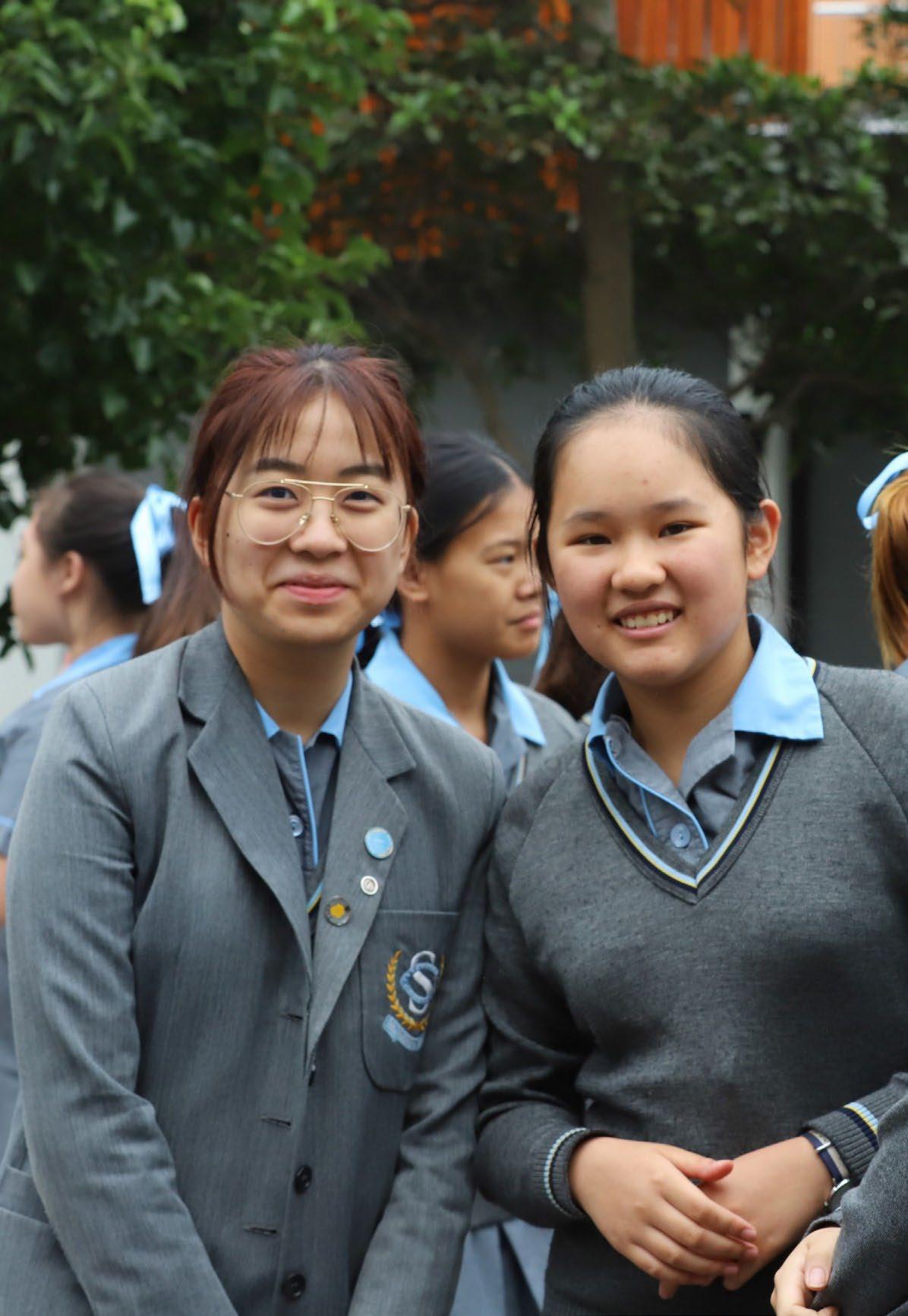Being an International Student
Living and studying in Australia is a perfect opportunity to create friendships with people from all over the world and to open yourself up to new experiences and ways of thinking.
It is natural to have mixed feelings attending school in a new country. It can be exciting to make new friends, to experience a new culture and to be more independent. You may also feel unsure, homesick or lonely. These are all valid feelings.
Life in a new school will become easier as you become more familiar with the School routine, the Australian culture and start to make new friends.
Be aware that a transition period, during which you adjust, is natural.
Experiencing Australian Culture
You may find the following information on Australian social culture useful:
o Australians often say what they think and give their opinions freely and openly. They can be very direct and expect others to be straightforward too.
o Australians follow certain protocol and etiquette by knocking on doors before entering a room (please keep this in mind if you need to see a teacher).
o Teachers are called by their title and their surname, not just by their surname, eg ‘Ms Smith’, not ‘Smith’.
o www.studyinaustralia.gov.au/ offer some helpful advice on living in Australia.
3 International Student Welcome Book St Catherine’s School
Adjusting to Cultural Change
Exploring cultural differences can be one of the most rewarding things about living in Australia. As you make the transition to life in a new country, it is not unusual to feel a range of emotions from:
o happiness and excitement about travelling and seeing new things
o anxiety and loneliness when school life starts and everything seems unfamiliar
o satisfaction and stability as you learn to adjust to your new environment and to develop a routine.
To assist in adjusting to your new environment:
• Give it time – Take one day at a time.
• Get your bearings – Try and become familiar with your timetable and the map of the School in your School Record Book.
• Try not to place too much pressure on yourself to achieve high marks; just do your best (you need to become familiar with what is expected in a new education system).
• Talk to someone and express how you feel – it may be helpful to talk to your teacher, Head of Year or the School Counsellor about how you are feeling.
• Getting to know people from other cultures will teach you a lot about yourself, Australia, and help you adjust sooner. The more you practise speaking in English to people, the more confident you will feel.
• There is no secret to making friends. Be prepared to be open, to make the first move, and to have a sense of humour. Talk about things you are genuinely interested in or want to know more about.
• Engage in activities that you love, for example write a journal, play sport, draw, paint, play music or dance.
• Create your own space – making your space your own can help you bring a bit of home to school. Your favourite pictures, books, photos and ornaments may help to make your space more like home.
4 International Student Welcome Book St Catherine’s School
International Students in Australia
What you need to know:
The ESOS Act covers a range of information you have a right to know about and the services that must be offered to you by St Catherine’s School. These include:
• Orientation to help you understand the course and about the place you are studying, as well as access to support services that can help you study and adjust to life in Australia.
• Key contacts for academic and personal support.
• Requirements for satisfactory attendance.
• Requirements for satisfactory progress in the courses that you are studying and what support is available if you are not progressing well
• A complaints and appeals process.
• All other relevant rules, regulations and policies that are implemented by the School.
Your responsibilities:
As an international student on a student visa (sub-class 500), you are responsible for:
• Complying with your Student Visa conditions.
• Ensuring you have and continue to maintain your Overseas Student Health Cover (OSHC) for the duration of your enrolment as an international student in Australia.
• Informing the School of any change of address or other contact details.
• Adhering to the terms of the Written Agreement with the School.
• Maintaining satisfactory course progress
• Maintaining satisfactory attendance (please note that early departures and late arrivals in the school term will affect your course attendance and may compromise your student visa)
5 International Student Welcome Book
Catherine’s School
St
Life at St Catherine’s
The Australian education system is based on enquiry methods of learning to develop solid research and critical thinking skills, rather than on rote learning (memory work).
• You will find that many teachers use group work, where you are required to work as part of a team, rather than individually. It is a classroom activity designed to encourage teamwork and the sharing of ideas.
• Your teachers will encourage you to analyse information and to form your own opinions. There will not necessarily be a ‘right’ answer in English or Humanities based subjects.
• Students in Australia often study alone and they are expected to produce work independently.
• It is not acceptable to plagiarise (copy) work from other students, books, the internet or any other sources. Please check the plagiarism section in the Student Record Book for more information.
• If you do not understand how to do something, your teacher can help.
• If you have a problem or concern, it is best to approach your teacher, your Head of Year, the Head of Boarding Services, the School Counsellor or the School Nurse for assistance. Other support numbers are listed on your International Student Contact Card.
• Our café uses the freshest ingredients and variety of cooking techniques to create meals and spaces that are a social, positive experiences for all staff and students at St Catherine’s. Our service is underpinned by the “smart food program” which ensures wellbalanced and nutritionally-sound menus, including provision for specific dietary requirements.
6 International Student Welcome Book St Catherine’s School
myStCatherines
At St Catherine’s we provide a centralised secure online portal –mystcatherines, where students and parents can access School information specific to their relevant year level and involvement. To login please use the email address you have provided to the school and the password will be emailed yearly to you.
For parents, mystcatherines will give you access to School Calendar, reports, newsletters, cocurricular enrolments, interview bookings and payments.
Visit https://myportal.stcatherines.net.au/

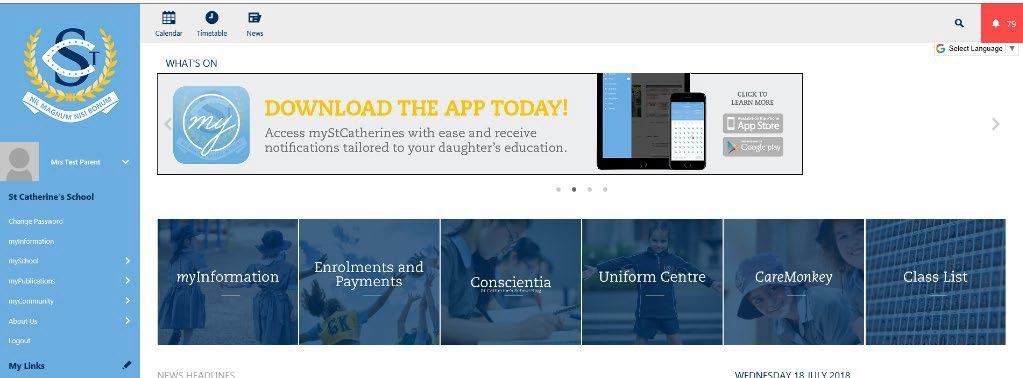
For students, The Fountain will provide you with quick links to everything from ICT Support and Health Information, to Transport tips and your Year Level information. mystcatherines Year Level will provide you with information and resources relevant to your classes, a place to submit classwork and assignments electronically and to receive the grades and comments for submitted work. The class pages also provide immediate communication between a class and teacher, and other web-based tools such as discussion forums, embedded video and online assessments. At the end of the semester, an Academic Transcript and a House and Participation report will be provided on the Portal.
Find the Fountain at https://myportal.stcatherines.net.au/homepage/16599
7 International Student Welcome Book
Catherine’s School
St
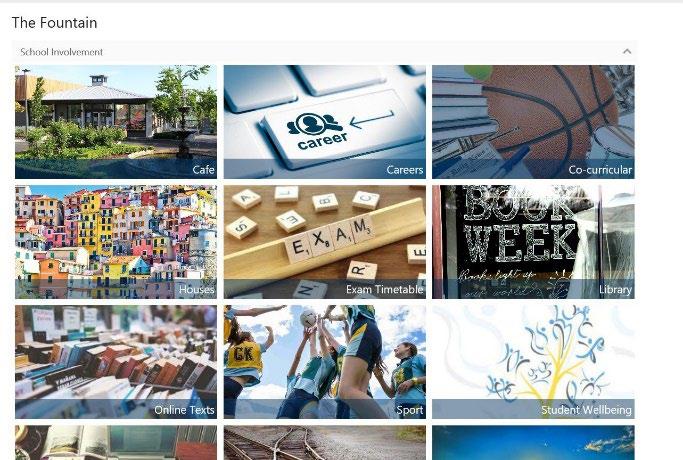
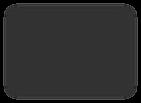
The St Catherine’s School App will also ensure you have easy access to receive notifications from mystcatherines. Visit the Apple App Store or Google Play for ‘St Catherine’s School’ to download the School App.
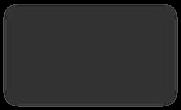
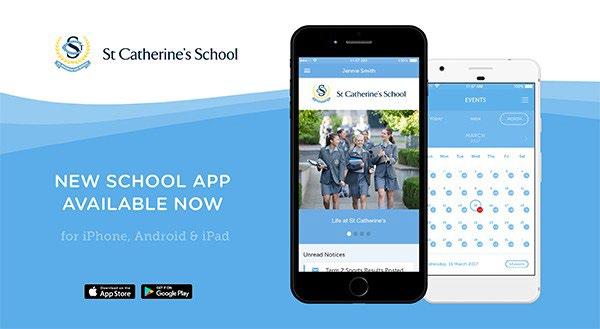
8 International Student Welcome Book St Catherine’s School
Accommodation
Overseas students enrolled at St Catherine’s may either:
a) Live in Australia with a parent, a Department of Home Affairs approved relative or a legal custodian;
b) Live in the Illawarra Boarding House; or
c) Live in Australia under a Homestay accommodation arrangement approved by St Catherine’s School (at the discretion of the Principal).
The School will organise homestay accommodation, with the approval of the Principal, only on a case by case basis. Any prospective homestay host will be subject to stringent Child Safe screening and must agree to abide by St Catherine’s Child Safety Policy and procedures.
Boarding students will need to advise the Head of Boarding Services of their holiday plans which will need to be confirmed by the parents. They will also need to liaise with the Head of Boarding Services regarding flights, pick up arrangements. More information about life in the Boarding House can be found at https://myportal.stcatherines.net.au/homepage/6192
Short Term Homestay:
As the St Catherine’s Boarding House closes during school holiday periods, it may be necessary to put in place Short Term Homestay Regulations for overseas boarders if they are not in the care of their parent. St Catherine’s School prefers students stay in Homestays arranged by the Austrlaian Homestay Network, (AHN). Further information on AHN can be found on their website https://www.homestaynetwork.org/
Short Term Homestay regulations require that:
• all members of the household aged over 18 hold a Working with Children Check which will be verified using the Working with Children Victoria online validation tool;
• a referee check for suitability for child connected work is undertaken by the School;
• personal identification is checked against the WWCC details (eg Driver’s licence);
• a home visit has been undertaken by the School to ensure the accommodation is ‘appropriate to the student’s age and needs and that a sharead bedroom and a desk has been provided;
9 International Student Welcome Book
Catherine’s
St
School
• the Homestay Responsibility Agreement is signed;
• all household members aged over 18 are made aware of the Child Safety Policy, reporting procedures and sign and agree to the Child Safety Code of Conduct.
10 International Student Welcome Book St Catherine’s School
Student Wellbeing
At St Catherine's School, our unwavering commitment to student wellbeing is paramount. We take a comprehensive approach to nurturing the holistic development of our students, spanning from Year 7 to 12. Within our structured wellbeing sessions, we meticulously address our multifaceted wellbeing model, ensuring the well-being of the "whole student" is addressed. These sessions are thoughtfully complemented by dedicated Academic Advisory time, which serves as a crucial pillar of support for our students' academic journey. Furthermore, our Student Voice initiative empowers students to lead and have a say in their educational experiences at St Catherine's School. This includes planning events and actively contributing to their own learning journey.
Counselling Support
In addition to the support provided by your teachers, House Tutors and Head of Year, the School Counsellor is available to all students seeking assistance or advice. Simply email counselling@stcatherines.net.au to arrange an appointment or speak with your Head of Year, class teacher or the Head of Boarding Service, who can help to organise an appointment. Links to support lines and sites external to the School include:
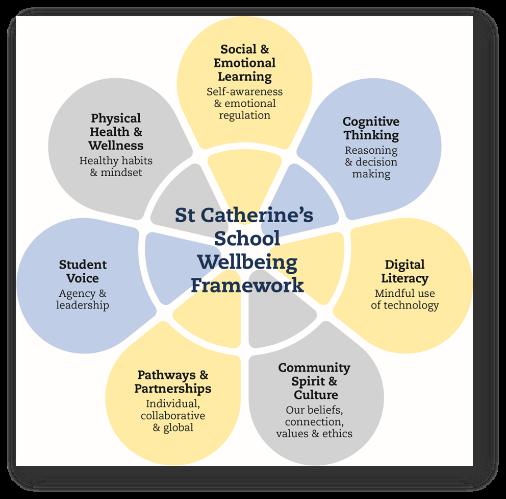
10 International Student Welcome Book St Catherine’s School
youthbeyondblue.com 1300 224636 headspace.org.au 1800 650890 kidshelpline.com.au/teens 1800 55 1800 reachout.com lifeline.org.au 13 11 14
Support Services - School Contacts
St Catherine’s School, 17 Heyington Place Toorak, Victoria 3142
Reception 8.00am – 4:30pm 9822 1285
Illawarra Boarding House 9828 3074
Cultural Diversity Club
Academic support
• Head of Year 7 – Ms Sam Basford
• Head of Year 8 – Ms Kathryn Lucas
• Year of Year 9 – Ms Liv Cher
Ms Winnnie Xie
• Head of Year 10 – Mr Clint Blennerhasset
• Head of Year 11 –Ms Vicky Spanos
• Head of Year 12 – Ms Tracey McCallum
• Director of Senior Years – Mrs Alison Cassidy
• Director of Middle Years – Ms Freda Armstrong
Personal support and counselling
• Head of Boarding Services (Claire van Boxel) +6139828 3074
cvanboxel@stcatherines.net.au
• School Counsellor 9828 3907 counselling@stcatherines.net.au
• School Nurses (Sally Jack / Anne Quirk) 0438 606 140
• School Health Centre 9828 3085 nurse@stcatherines.net.au
In case of Emergency
• Local Doctor – Toorak Medical Centre 9826 8437
• Fire, Police or Ambulance Call 000 or Mobile 112
• Poisons Information Line 131126
• Cabrini Hospital, Malvern 9508 1222
St Catherine’s School
11
Student Welcome Book
International
Student Grievances
St Catherine’s School has a fair and transparent process for dealing with student grievances. In the event that such grievances cannot be resolved internally, students can seek further assistance from the following external organisations.
Victorian Registrations and Qualifications Authority (VRQA)
St Catherine’s School is regulated by the Victorian Registrations and Qualifications Authority (VRQA). Students can contact the VRQA if they have concerns.
• VRQA (Monday- Friday 9.00am to 5.00pm) +61 3 9637 2806
• www.vrqa.vic.gov.au
Commonwealth Ombudsman
• 1300 362 072
• http://www.ombudsman.gov.au
Child Safety at St Catherine’s School
St Catherine’s School complies with the Victorian Government Child Safe Standards and has a Child Safe Policy and Child Safe Code of Conduct that applies to all members of the School Community.
As a Child Safe School, St Catherine’s is committed to empowering girls in an environment where they can feel safe, secure, valued and respected. We strive to create a culture in which staff, volunteers, children and families feel comfortable and supported when talking about any child safety concerns. Children have rights and are encouraged to express any concerns about their safety to one of the designated Child Safety Officers; the Head of Psychological Services, the Director of Senior Year, the Director of Middle Years, the Deputy Head of Junior School or Head of the Early Learning Centre.
12 International Student Welcome Book
Catherine’s School
St
International Student Safety Contact Card
International Students are issued with a Student Safety Contact Card to ensure that you have access to important emergency contact phone numbers. This card includes the details of the School Child Safe Officers so you can contact them if you ever have concerns for your safety at School, in the Boarding House, Homestay, or in the community.
The card also lists the VRQA and Commonwealth Ombudsman details should you wish to report a concern about an issue concerning the School.
Rules Regarding Tutoring
International Students in the Boarding House or Homestay may only engage external tutors with the permission of the Head of Boarding Services and the tutor must conduct the session in the Boarding House. All tutors will be provided with a Child Safety Induction pack and training and are required to provide a Working with Children Check if they are aged over 18 years. The Working with Children Check number will be verified prior to the first session and checked regularly using the Working with Children Check online validation tool.
Engaging in Education with External Providers
International Students are not permitted to enrol in programs with external Education Providers (such as VCE studies, languages studies, VET studies, and other education courses/programs) without the consent of the School.
If approved, the student must undergo a Child Safety briefing to understand their rights and responsibilities. The Education Provider must also provide the School with evidence of their Child Safe Policies and documentation verifying employee training and registration.
Students and their parent will be asked to sign a consent form, verifying their understanding of their obligations when engaging in an arrangement with an external Education Provider.
13 International Student Welcome Book St Catherine’s School
Local Contact checks:
International students are required to provide a local contact person to assist with liaison with the overseas parent.
• The Local Contact must be prepared to undergo Child Safety screening as outlined in the Welfare Policy: Full-Fee Paying Overseas Students.
Public Transport in Melbourne
Melbourne’s trains, trams and buses are an easy way to travel around the city. All you need is a Myki card and you’ll be ready.
St Catherine’s School is located close to Heyington Station, which is on the Glen Waverley Metro Trains Line. Trams to the city can be boarded on Toorak Road at the tram stop.
Always remember to touch on and off your Myki as you enter the paid area of a train station or board a tram (except if travelling exclusively within the Free Tram Zone in the CBD) or bus.
More information on the Public Transport Victoria network and the Myki ticketing system can be found on https://www.ptv.vic.gov.au. Information in other languages can be accessed on https://www.ptv.vic.gov.au/languages/
Care should be taken when on public transport and in public places to avoid conversations with strangers.
Try to avoid walking alone at night and if this is necessary please stay on well-lit streets.
14 International Student Welcome Book St Catherine’s School
Unsafe locations
Every city across the globe has some areas that may not be safe. In your home city, you probably know of these areas and know how to avoid them. If you are not familiar with the areas to be careful of, you can check with a staff member.
Beach safety
Although Australian beaches may look beautiful, they can be unpredictable and hide some dangers that every visitor should be aware of. Here you will find some very helpful info and advice on beach safety.
Always Swim Between the Red and Yellow Flags
When you see red and yellow flags on a beach, it indicates that there is currently a lifesaving service operating on that beach. The lifeguards have chosen a section of the beach that is best for swimming and they will closely supervise this area. Lifeguards pay more attention to the area between the red and yellow flags than any other part of the beach.
Read the Safety Signs
Before you go on to the beach be sure to read the safety signs. This will ensure you are aware of any warnings or dangers on the beach. You can also find other helpful information to make your day at the beach more enjoyable
Ask a Lifeguard for advice
Lifeguards are highly trained and very knowledgeable about beach safety and conditions.
Swim with a Friend
Not only is swimming with a friend (or family member) a fun way to enjoy the beach, it is also very sensible. While you are swimming together you can keep an eye out for each other, and if further assistance is required, one person could call or go for help.
If you need help, stay calm and attract attention.
If you are not feeling comfortable in the water and you require a lifeguard’s assistance to get back to shore, stay calm, raise your arm in the air and wave it from side to side. This will attract the attention of a lifeguard who will be able to come to your assistance. You should conserve your energy by floating on your back and staying calm. This will ensure you have the
15 International Student Welcome Book St Catherine’s School
energy to remain afloat until further aid arrives. More information on Beach Safety is available at https://beachsafe.org.au/surf-safety
Drugs and alcohol in Australia
Alcohol is readily available and legal for those over 18 years of age. Other substances such as marijuana, ecstasy, cocaine, methamphetamines, etc are not allowed by Australian law and you run the risk of legal and visa problems as well as health issues if you become involved in their use / dealing.
You are advised to familiarise yourself with the emergency response and evacuation plans. Evacuation procedures are covered during student induction.
Smoking in Australia
Federal law bans smoking in all Australian Commonwealth government buildings, public transport, airports, and international and domestic flights. Further bans are in place but are governed by individual states. In all Australian states and territories have banned smoking in vehicles with children, in some enclosed public places, particularly most major companyowned workplaces, and most enclosed restaurants.
Tobacco or nicotine vaping products cannot be sold or supplied to persons under 18 years old, but there is no legal age to use them. The Australian Government has made very few laws on electronic cigarettes and leaves it up to the states.
Critical Incidents
If a critical incident occurs, students can call a staff member listed on their Safety Card to ask for support. If the incident is life threatening, students should call Emergency Services on 000 immediately.
Any discrimination or harassment of staff, students or visitors because of their sex, pregnancy, race, colour, nationality, ethnic or ethnoreligious background, marital status, physical or intellectual or psychiatric disability, homosexuality or age will not be tolerated and is illegal under the requirements of the Anti-Discrimination Act 1977. You are responsible to ensure non-discriminatory or harassing behaviour at all times to other students, staff or visitors to the school.
16 International Student Welcome Book St Catherine’s School
Quick Links
• mystcatherines
https://myportal.stcatherines.net.au/
• mystcatherines Boarding
https://myportal.stcatherines.net.au/homepage/4022
• mystcatherines International
https://myportal.stcatherines.net.au/homepage/16060
• St Catherine’s Policies - http://www.stcatherines.net.au/aboutus/policies/
17 International Student Welcome Book
Catherine’s School
St

